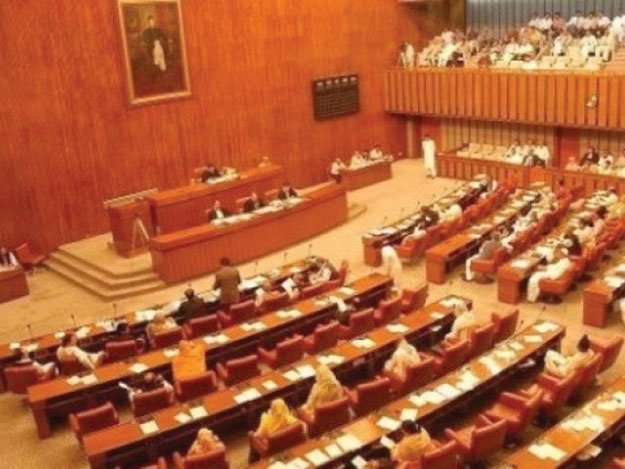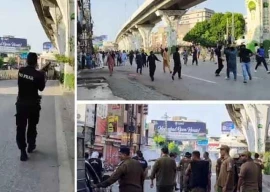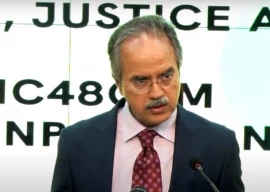
The apex court on Tuesday also observed that “commoditisation of high positions and offices” through manipulation of votes and electoral tampering must be stopped.
The observation came from a two-judge bench of the court, comprising Justice Gulzar Ahmad and Justice Qazi Faez Isa, which ordered re-elections to the posts of chairman and deputy chairman of Khushab District Council.
The top court also set aside a verdict by the Islamabad High Court (IHC) which restored politician Sumaira Malik as district council chairperson. The IHC had also set aside an order by the Election Commission of Pakistan (ECP) for a re-poll in Khushab District Council.
Senate panel wants to go soft on non-filers in property, car purchases
“The impugned judgment dated July 7, 2017 of the Islamabad High Court is set aside; the Election Commission is directed to hold election to the posts of Chairman and Deputy Chairman of Khushab District Council and in this regard to issue a fresh election schedule at the earliest since considerable time has already expired,” reads the judgment.
The judgment authored by Justice Isa reads: “The Election Commission is constitutionally mandated to ensure the integrity of elections. However, when the integrity of the vote is compromised, fresh elections must be held. Particularly when less number of voters make a re-poll logistically feasible and easily implementable.
“Popular candidates who are not involved in vote buying and malpractice should have no apprehension in a re-election. Therefore, in elections where serious concerns over the integrity of the process have emerged, fresh elections are in the best interest of the people because they ensure maximum transparency, fairness and equal opportunity. Fresh elections would also ensure the integrity of the democratic process.”
The order further says that the foundation of a representative democracy rests on a credible electoral process. It says a democratic facade is not a substitute for democracy.
“General Zia-ul-Haq held a referendum on December 19, 1984 and obtained 98.5 per cent of an affirmative vote, and in General Pervez Musharraf’s referendum held on April 30, 2002 he obtained a 97.97 per cent affirmation. However, many election observers questioned these results as well as the turnout, which was shown to be greater than the previous seven general elections.”
The judgment also says, “Elections must not only be held, but be seen to be held honestly, justly, fairly and corruption free, and the ECP is constitutionally mandated to ensure that elections are held honestly, justly, fairly and in accordance with law, and that corrupt practices are guarded against.”
The judge in his 17-page verdict further observes that there’s a growing perception that elections to certain positions or offices, like those of mayor, deputy mayor, chairman, vice chairman, are not held honestly, justly, or fairly and the corrupt practice of vote buying has made inroads into the democratic order.
“There’s a similar perception in respect of other elections where there aren’t many voters. For instance, the election of senators, who are elected by the members of provincial assemblies, and the election of Chairman and Deputy Chairman of the Senate, who are elected by the senators.”
The court notes that it is critical that those who represent the people, whether at local government or in the Senate, must be elected honestly, justly, and fairly through a process free from corrupt practices.
The verdict says that the ECP is a constitutional body and unless it is shown that the jurisdiction and discretion exercised by it is manifestly illegal, arbitrary or mala fide, its workings should not be interfered with. It says the polls body had ordered a re-poll and its decision cannot be termed illegal, arbitrary or mala fide.
“The learned Judge of the High Court failed to appreciate that re-polling in this case involved less than a hundred voters and such a re-poll would cost next to nothing. In contrast, in a general elections thousands, if not hundreds of thousands, cast their votes and conducting such an election would entail not only a substantial financial outlay but also the allocation of sizeable human resources,” it says.
“However, elections by a select body, such as in the present case, does not require such financial or human resource outlay. Whilst the considerable resources required and involved in a re-poll in general elections might give pause, however, where the voters are comparably limited this is not a consideration,” it adds.
According to the order, the conduct of elections includes the maintenance of secrecy. If secrecy of the ballot has been breached or elections have not been held honestly and, or corrupt practices have taken place, the polls body is fully empowered to take remedial actions.
“It would be wrong to assume that despite the directives contained in Article 218(3) of the Constitution, the Election Commission is helpless or that it can elect not to implement the constitutional mandate. The Act requires the Election Commission to conduct the local government elections (Section 19), without placing any fetters on the powers of the Election Commission to do so,” it says.
“There is no reason for us to exclude there from order of a re-poll if elections are not held in accordance with law, mandating secrecy, fairness, justness and/or which are not free from large scale malpractices,” it adds.
‘General elections should not be conducted like Senate elections’
The court notes that the polls body has the power to order a re-poll before it has issued the notification declaring the winning candidate(s); it next needs to be examined whether in the facts and circumstances of the case ordering a re-poll was justified.
The judgment reads, “The Presiding Officer was an official designated by the Election Commission to perform duties in connection with the elections, including maintaining the secrecy of the ballot. The Presiding Officer personally observed that a number of voters had breached the secrecy of the ballot and submitted a written complaint.
“In his complaint he also named the voters who had shown their ballot papers after they had marked them but before they had put them in the ballot box. The person under whose supervision the poll took place himself submitted a written complaint to the Returning Officer which was received by him.
“Therefore, it is not understandable why the additional need to record evidence by the Election Tribunal, as held by the learned Judge. Since the contesting respondents had alleged that no complaint was submitted by the Presiding Officer, Israr Ahmed, we summoned the official.
“After the breaking open of the sealed bag in which the said record came, the contents of the bag contained the said complaint on which appeared the signature of the Returning Officer in confirmation of its receipt. Therefore, we conclude without hesitation that there were sufficient grounds before the Election Commission to order a re-poll.”

















COMMENTS
Comments are moderated and generally will be posted if they are on-topic and not abusive.
For more information, please see our Comments FAQ